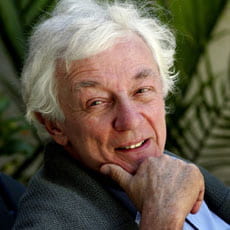CCLP senior fellow Richard Reeves examines the key causes and dire consequences of the Japanese-American internment in relocation camps during World War II in his new book, concentrating on a shortsighted military strategy and anti-Japanese sentiment following the December 7, 1941 attack on Pearl Harbor.

“A day that will live in infamy,” President Franklin D. Roosevelt said of the attack in asking Congress for a Declaration of War, after which the president himself signed an executive order that moved more than 120,000 Japanese, most of them American citizens, “behind barbed-wire and machine gun towers, into concentration camps spread across the most barren and hostile deserts and swamps of the country,” said Reeves. “Their only crime: looking like the enemy.”
Infamy: The Shocking Story of the Japanese American Internment in World War II provides an authoritative account of the incarceration of these American citizens and Japanese immigrants during the war. Men we usually consider heroes – FDR, Earl Warren, Edward R. Murrow – were in this case villains, but we also learn of many Americans who took great risks to defend the rights of the internees.
Reeves wrote the book because he doesn’t want that to happen again “if the nation becomes hysterical about real or imagined threats to national security,” he said. “Without knowing too much about it, I always wanted to study the incarceration of innocent Japanese-Americans in desert concentration camps during World War II. I found that what happened was far worse than I imagined. Fear, racism and raw greed drove Americans to crush thousands of lives, breaking up families and stealing property under the leadership of men as historically revered as President Roosevelt and California’s attorney general, Earl Warren. Shamed, the victims of the camps refused to talk about it for decades, even as their sons served in the most decorated American combat unit in history. They do now. It happened here and it could happen again, to Muslims, to Latin Americans. I want to let people who love America and love the Constitution know that that “piece of paper,” as described by Assistant Secretary of War John McCloy, was shredded in a wave of national hysteria.”
Called “an engaging and comprehensive depiction of an essential, but sometimes overlooked, era of U.S. history” by Kirkus Reviews, the book tells the story of this appalling chapter in American history more powerfully than ever before.

“Reeves liberally quotes politicians, reporters and citizens, rehashing the argument that ‘a Jap is a Jap’ and therefore all Japanese aliens and even citizens on the West Coast needed to be removed,” writes Kirkus Reviews. “Reeves includes firsthand and secondhand accounts of life inside the camps. Though Reeves’ subject is an essentially bleak picture of hysterical racism…the author does a solid job of balancing the dreary passages with occasional shots of humor, humanity or both. Reeves unearths and makes public a painful national memory, but he does so while maintaining the dignity of those held behind barbed wire and unmasking the callous racism and disregard of the people who put them there.”
Tom Brokaw calls the book “a detailed account of a painful and shameful period in modern American history. Infamy combines Reeves’s journalist’s training with his historian’s eye to give us a page-turner on how hysteria at the highest levels can shatter our most fundamental rights. Brace yourself and read this very important book.”
Racism, greed, xenophobia, and a thirst for revenge: a dark strand in the American character underlies this story of one of the most shameful episodes in our history. But by recovering the past, Infamy has given voice to those who ultimately helped the nation better understand the true meaning of patriotism. The book is scheduled for publication on Tuesday, April 21, by Holt, Henry & Company.
Reeves, a former New York Times and Frontline journalist, a senior lecturer at the USC Annenberg School for Communication & Journalism, a syndicated columnist and an award-winning documentary filmmaker, is embarking on a national speaking tour to promote his new book, including participating on a panel at the LA Times Festival of Books at the Hancock Foundation at USC at 2 p.m. on Sunday, April 19. The panel will be moderated by Jon Wiener and look at American milestones in history. Joining Reeves on the panel will be Ed Larson and Scott Martelle. Reeves is also the biography judge for the LA Times Book Prize.
Reeves is featured in a film called “Searching for Camelot” premiering at the Garden State Film Festival on March 21. The film is about people who were living in Greenwich Village when John F. Kennedy became president. Reeves was interviewed in the film about what it was like to be in the Village in the 60s, what it was like living next door to Bob Dylan, and what it all meant (he doesn’t remember).
Reeves will be giving a series of lectures at the New York Historical Society in April on the Japanese internment. C-SPAN has filmed one of his classes on long-form journalism which they will broadcast later this spring.